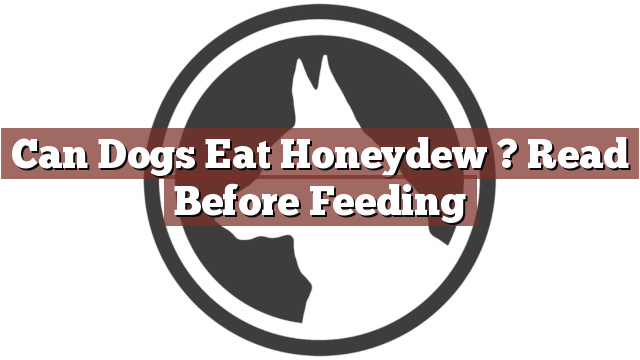Understanding Your Dog’s Dietary Needs
When it comes to feeding our furry friends, it’s important to understand their dietary needs. Dogs are omnivores, which means they can eat a variety of foods including fruits and vegetables. However, not all human foods are safe for our canine companions. It’s crucial to know which foods are safe and healthy for them, and which ones should be avoided. One such food that often raises questions is honeydew.
Can Dogs Eat Honeydew? Read Before Feeding
Can dogs eat honeydew? This is a common question that many dog owners have. The answer is yes, dogs can eat honeydew in moderation. Honeydew is a sweet and juicy fruit that is packed with essential vitamins and minerals. It is low in calories and a good source of hydration for dogs. However, it’s important to note that not all dogs may tolerate honeydew well.
Before feeding your dog honeydew, it is essential to remove the rind and seeds. The rind can be difficult for dogs to digest and may cause gastrointestinal upset. Additionally, the seeds can pose a choking hazard or cause an intestinal blockage. Always remember to cut the honeydew into small, bite-sized pieces to make it easier for your dog to chew and digest.
Pros and Cons of Feeding Honeydew to Dogs
Feeding honeydew to your dog can have several benefits. It is a great source of hydration, especially during hot summer months. Honeydew is also rich in vitamins A and C, which are essential for a healthy immune system and proper vision. The fruit contains dietary fiber, which can aid in digestion and promote a healthy gut.
However, it is important to take note of some potential drawbacks. Honeydew is high in sugar, so it should only be given to dogs in small quantities. Overconsumption of sugary fruits can lead to weight gain, dental issues, and even diabetes in dogs. Additionally, some dogs may have sensitive stomachs or food allergies, and honeydew can cause gastrointestinal upset or allergic reactions in such cases. Always introduce new foods gradually and monitor your dog for any adverse reactions.
Conclusion: Considerations for Feeding Honeydew to Your Dog
In conclusion, while dogs can eat honeydew, it should be given in moderation and with caution. Remove the rind and seeds before offering it to your dog, and cut it into small, manageable pieces. Monitor your dog for any adverse reactions, and consult with your veterinarian if you have any concerns about feeding honeydew or any other fruits to your dog. Remember, a balanced diet is key to keeping your canine companion healthy and happy.
Thank you for taking the time to read through our exploration of [page_title]. As every dog lover knows, our furry friends have unique dietary needs and responses, often varying from one canine to another. This is why it's paramount to approach any changes in their diet with caution and knowledge.
Before introducing any new treats or making alterations to your dog's diet based on our insights, it's crucial to consult with a veterinarian about [page_title]. Their expertise ensures that the choices you make are well-suited to your particular pet's health and well-being.
Even seemingly harmless foods can sometimes lead to allergic reactions or digestive issues, which is why monitoring your dog after introducing any new food item is essential.
The content provided here on [page_title] is crafted with care, thorough research, and a genuine love for dogs. Nevertheless, it serves as a general guideline and should not be considered a substitute for professional veterinary advice.
Always prioritize the expert insights of your veterinarian, and remember that the health and happiness of your furry companion come first.
May your journey with your pet continue to be filled with joy, love, and safe culinary adventures. Happy reading, and even happier snacking for your canine friend!

